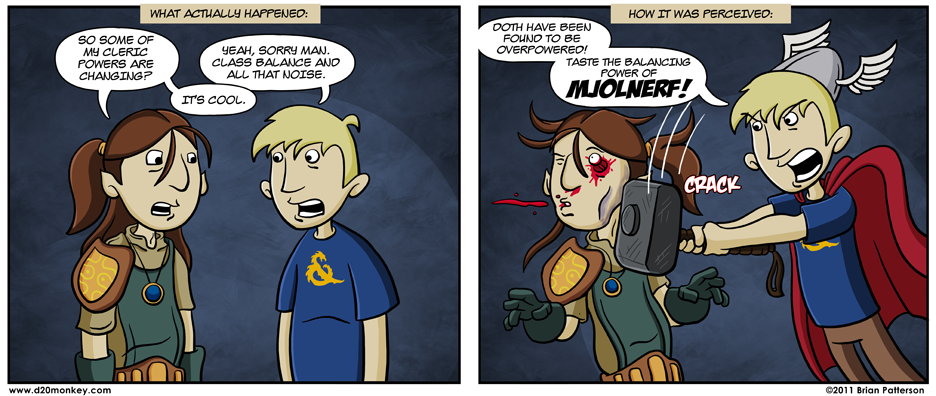Errata’d
The recent errata to the 4e cleric created some (inevitable) drama. Some love the changes while others fall into neckbeard rage over what could only be a personal insult to their beloved cleric PC. It happens with every errata update.
Truth be told, I never mess with errata (the official kind). Not out of disrespect for the designers but rather for continuity at my table. I’ve seen Player’s Handbooks given the errata treatment. Post-it notes sticking out of every page, entire sections covered over with print outs, and lines stricken enough black marker to rival the JFK files. A once proud, magnificent PHB now looks like the manifesto of a crazed librarian.
I’ll stick with the game as written. If balance issues or problems arise, I’ll do what all DMs do: I’ll handle it. Generally speaking, most players and DMs can handle such situations on their own.
I think of big errata as Pandora’s Box: Once you open it, you cannot close it.











Amen to that. I don’t really see what all the fuss is about. It’s a table top game, written in books. If you don’t like the changes, no one is standing behind you forcing you to commit to them! Play it the old way if that’s what you like.
There seems to be this perception among some role players that they have to stick to every single rule in every single book. It’s *your* game. You bought it, play it the way you want to.
Inevitably this makes me think on the comparisons of 4e to MMORPGs – where if they “nerf” a character, you don’t have a choice in the matter.
You captured how it’s difficult to have a rationale conversation about “updates” and errata. Well done.
I wrote last night that the errata changes are more difficult to ignore because they are tied into Character Builder. So ignoring errata (or “updates” as WotC calls them) means you have to give up managing your character in Character Builder.
It does change things a bit; errata is more difficult to ignore.
I thought the usual Wotc approach to errata was to print a new version of the manuals and add a .5 to the title.
Errata (Noun): That thing that is always optional. hell, my GM let me use the OLD heirloom weapon instead of the very useless new one.
(favored weapon of choice gets +1 attack, you get a masterwork for the cost of a normal to start)
MJOLNERF!!! LMFAO
When I first read D&D 3.0 I immediately errata’d the primary stats of the Priest and the Sorcerer, since the printed version switched them for some reason. Sorcerer’s impose their will upon the universe, but Charisma is not will, Wisdom is. And Clerics manipulate people to get more followers for their deity, thus increasing that deity’s power. They also “cast” spells by praying and sweet-talking their deity into providing the effect. And religious sorts are never a source of wisdom, just dogma. Clearly Clerics should have always been based on Charisma, not Wisdom.